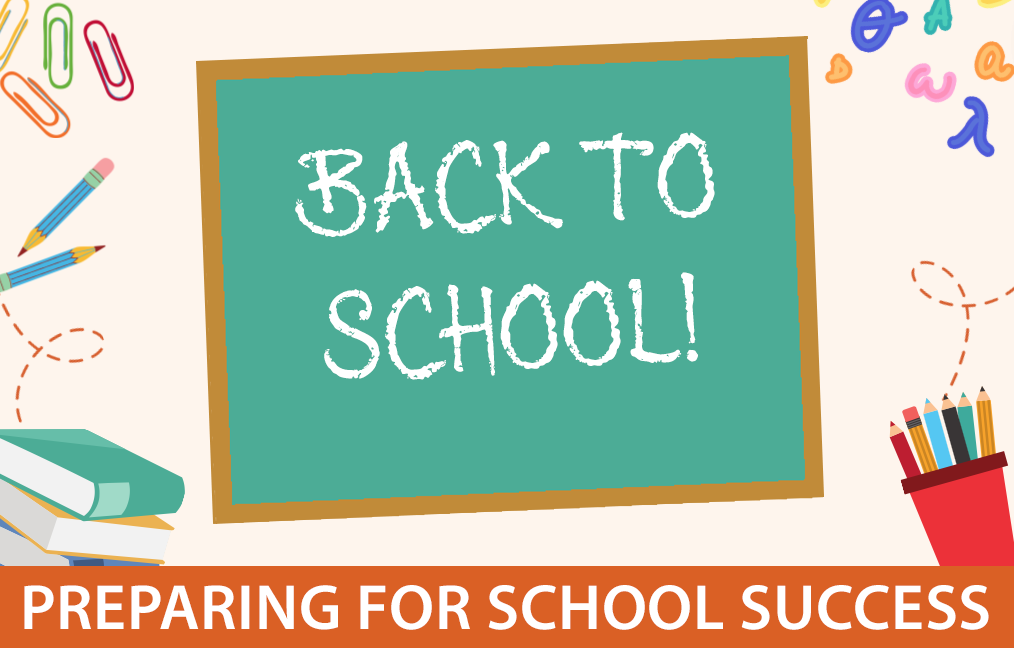
27 Jul Back to School: Preparing for School Success
A Love of Learning
Active Parenting parents take education seriously. They understand that it is about more than just grades; it is about fostering a desire to learn. It’s likely that children will become lifelong learners when their curiosity is sparked, when they experience the pleasure of discovering something new, or when they read something that moves them. Children will want to keep doing things that feel good—like when they feel the excitement and pride of success when they achieve or create something new. Children with a love of learning are on the path to school success. It’s a great step toward thriving in school and beyond.
Preparing for School Success
While there are many factors that contribute to a child’s school success—over two hundred studies have reported that parent involvement is the most important. But thinking about staying involved can seem overwhelming and often confusing. We at Active Parenting, and our Leaders, want to share valuable resources to take some of the stress out of parenting so that parents can enjoy this incredible time with their children. And we offer tools to support parents in raising responsible, cooperative, confident children that will thrive.
Seven Ways to Help Children Succeed in School:
- Show up & show support. Attend Parent/Teacher Night and conferences. Look for opportunities to volunteer. Be there for school plays and other special activities when you can. Some parents recognize that they need to participate in their child’s education but tend to go too far and become over-involved. Other parents understand that school is a child’s job, and children need freedom to make choices and mistakes, but they tend to back off too far and don’t show enough support. Balance is key here—Active Parenting parents allow freedom within limits—knowing when to step in and help, when to step back, but are ready to offer support when appropriate. Encourage your child to share their experiences, challenges, and achievements at school, and provide guidance and support accordingly. When parents are engaged both at home and at school, studies show that children are more likely to:
- get better grades.
- do better on standardized tests.
- have higher attendance rates.
- graduate and go on to college/trade school/military.
- get involved in extracurricular activities
- feel more connected to the school.
- have higher self-esteem and better behavior.
- Get to know your child’s teacher & encourage them.
 Establish open lines of communication with your child’s teachers and school staff. Parents can let teachers know they are valued and appreciated with kind words or thank you notes/emails. When a teacher feels supported, they feel better about their mission to educate students. Stay informed about your child’s progress and address any concerns promptly. When parents build a positive, supportive relationship with their child’s teacher, everyone benefits.
Establish open lines of communication with your child’s teachers and school staff. Parents can let teachers know they are valued and appreciated with kind words or thank you notes/emails. When a teacher feels supported, they feel better about their mission to educate students. Stay informed about your child’s progress and address any concerns promptly. When parents build a positive, supportive relationship with their child’s teacher, everyone benefits. - Make learning a family priority. When parents make learning a priority, it fosters an interest in learning not only in school but everywhere. Learning is a lifelong endeavor—so make it fun! Here are some ways to show that learning is a priority:
- Model the importance of learning by taking courses, reading, and using media to learn new things while encouraging children to take part when they can.
- Incorporate interesting news items or facts into the family discussion at dinner.
- Make it fun! Take children to museums, historical landmarks, libraries, and other learning centers. Combine learning and entertainment—go for a hike and find something unusual and see what you can learn about it together. Visit a farmers’ market and talk about fruits, vegetables—where they come from, and any art you see there. After sporting events have, help the kids find out if the team or players did better or worse than their averages.
- Develop a “work before play” philosophy in your family. Make schoolwork the first priority. Exceptions can be made, but the key is an attitude that work is vitally important. “When you finish your homework, then you can play outside.”
- Limit TV watching and other “screen time” for everyone in the family, especially during homework and bed times.
- Compliment children on how they use their minds more than their ability to play a sport, look good, or be popular.
- Structure homework time. Develop a consistent routine that includes set times for homework, studying, meals, and bedtime. A structured routine helps children develop good time management skills and creates a sense of stability, which positively impacts their academic performance. Schedule a Family Meeting to discuss the following ways to take some of the frustration out of homework time so that kids can get the most out of it and do better in school:
- A regular work area. Designating a “regular” quiet work area will help cue the child that it is time to work, not play. Kids have their own preferences about studying and that is okay if they are able to concentrate and get the work done. TV and loud, distracting music, have been found to interfere with concentration.
- A regular study time. Set aside a specific time for homework knowing that flexibility will be required for special events. Some kids may prefer to get it done right after they get home from school while others may want time to play or relax before diving into more schoolwork. Dr. Popkin recommends a work-before-play philosophy. If your child wants a break from school before doing homework, that’s a good time for physical activity or creative play—not TV or other media.
- A homework “to-do” list. The “to-do” list (using a notebook or electronic device) is a powerful time management tool. This will help your child succeed at school and in life. Parents can check and encourage their progress. Be consistent to develop this good habit. A “to-do” list will reduce anxiety about something “falling through the cracks,” and checking off items as they are completed provides satisfaction.Parents can strike a balance between offering guidance with homework when needed and encouraging their child’s independence and problem-solving skills. Teach kids effective study techniques such as organizing notes, making flashcards, and breaking tasks into manageable chunks.
- Read and talk with your child. Reading aloud to your child is the best way to improve reading skills and it’s the best predictor of school success. Research shows that reading skills are also the best predictors of algebra skills, career success, and earning power. Encourage reading for pleasure with age-appropriate books. Visit the library so children can pick their own books. Reading to your children is a great way to bond as you snuggle together and explore exciting worlds sparking curiosity and encouraging thoughtfulness. This positive time spent together will foster a love of reading. For older children, start your own family book club. A good goal is to read together 20 minutes a day. Start this daily habit as soon as your child’s eyes can focus on the pictures. As kids get older, they can read to you. Reading is the key to learning so nurturing a love of reading is a great way to help your child succeed in school and thrive in our communication-based society.
- Filter and limit your child’s media. Media has become an important part of how we learn and interact with others so children need to learn how to use technology and media skillfully. There is also an inherent risk in opening this adult world to our children. Media can be an unhealthy influence on a child’s values. Sexual and violent content is everywhere. Children post comments and pictures unaware that it’s there forever and can open the door for predators. Active Parenting parents try to limit as much as they can, but they realize that the best filter is the child’s own brain. So, they also teach their children how to make good decisions for themselves. Here are some suggestions for helping your child learn to use the internet and other media safely and effectively:
- Help your child find useful websites that can help them with homework. Use websites together to plan family trips, look up local activities, get information, and explore the world.
- Pay attention to any games, apps, or other media they use. Talk with them about avoiding games that are overly violent or sexual or contain other unhealthy content. Use rating codes to help you decide what is okay and what is off-limits.
- Use filters to block your child from accessing sites that may be harmful. There are filters that you can install on your computer or are offered for free by Internet service providers. Filters are not always completely effective, and sometimes children find ways around them. The best safeguard is your supervision and involvement.
- Monitor the amount of time that your child spends online. Scrolling can be just as absorbing as watching TV, maybe even worse.
- Develop a clear set of guidelines for using the Internet. Do this together at a family meeting, encouraging input from everyone. For example:
Our Family Internet Guidelines
For our own safety and the safety of other family members, we agree
to these guidelines:
- We will not tell anyone—including friends—our computer passwords.
- We will not use bad language or send cruel, threatening, or untrue e-mails or text messages.
- We will not give out personal information to anyone we don’t know in real life. This includes our own name, family members’ names, home address, phone number, age, or school info (name, mascot, colors, etc.).
- We will not arrange to meet a stranger that we have talked with online.
- We will not post or e-mail pictures or videos of ourselves that we would not want our parents, boss, or other people now or in the future to see.
- Support your school’s discipline plan. Imagine how frustrating and chaotic it would be to play a game without rules. Whether it’s a family, a school, a large corporation, or even a country, without rules, conflicts get worse rather than better until the entire system breaks. Make sure children know the school rules and support them. Have a family talk to review and discuss the school’s discipline plan.
The Seven Ways Parents Can Help Children Succeed in School comes from our Active Parenting 4th Edition Parent’s Guide, check it out for more details. For more information on helping younger children (ages 1-5) prepare for school, check out our blog: Teacher Appreciation: Preparing Children for School. Check out this Special Education Toolkit from National PTA for more specific information on school success for children with functional needs.
Parent engagement plays a critical role in a child’s success at school but it’s important to promote healthy lifestyle habits as well. Ensure your child has nutritious meals and snacks to fuel their brain and body. Encourage regular physical activity and adequate rest to enhance focus, concentration, and overall well-being.
Stay in touch for tips, tools, and other resources to reduce stress and bring joy back to parenting. We also want to hear from you! Share your thoughts and experiences in the comments section under this post on our social media pages.
![]()
![]()
Additional Resources:
- Parents Guide to Student Success from National PTA. This guide includes:
- An overview of some of the key things your child will learn in English/Literacy and Math in Kindergarten through High School
- Ideas for activities to help your child learn at home
- Topics of discussion for talking to your child’s teacher about his or her academic progress
- Parent Engagement in Schools from the CDC provides Ways to Engage in Your Child’s School to Support Student Health and Learning
- Special Education Toolkit from National PTA. This toolkit gives an overview of federal disability and functional needs policies and educates families on how to get the best special education, services, and resources available.
- A Guide to the Individualized Education Program from the U.S. Department of Education
Active Parenting Publishers founder and president Michael H. Popkin, Ph.D. has been providing research-based education programs with an emphasis on nonviolent discipline, mutual respect, and open communication for 40 years. He is widely known for his expertise in the field of parent education and has appeared on over 100 TV programs, including CNN and The Oprah Winfrey Show.
STAY IN TOUCH!
Click here to receive the latest news and offers from Active Parenting! And follow us on social media:

 Establish open lines of communication with your child’s teachers and school staff. Parents can let teachers know they are valued and appreciated with kind words or thank you notes/emails. When a teacher feels supported, they feel better about their mission to educate students. Stay informed about your child’s progress and address any concerns promptly. When parents build a positive, supportive relationship with their child’s teacher, everyone benefits.
Establish open lines of communication with your child’s teachers and school staff. Parents can let teachers know they are valued and appreciated with kind words or thank you notes/emails. When a teacher feels supported, they feel better about their mission to educate students. Stay informed about your child’s progress and address any concerns promptly. When parents build a positive, supportive relationship with their child’s teacher, everyone benefits.